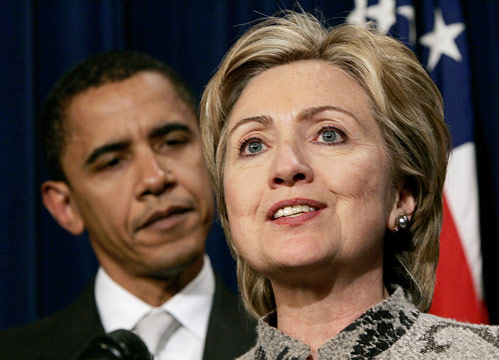 After the small democracy constitutionally removes its president, Chávez and Castro call it a coup. Canada recognizes the new president; the U.S. is missing in action.
After the small democracy constitutionally removes its president, Chávez and Castro call it a coup. Canada recognizes the new president; the U.S. is missing in action.
Paraguay may not have a lot going for it. But it does have this: a chief justice on the high court who is not intimidated by the left when asked to uphold the constitution. I know lots of people who wish they lived in a country like that.
The recent Paraguayan Supreme Court ruling, which unanimously allowed the lawful congressional impeachment of President Fernando Lugo on June 22 to go forward, was not without risk of special-interest backlash. But in making the decision, the top judge on the court’s constitutional panel used the law as the guide, not a political weathervane.
Well, never mind the legal mumbo-jumbo. Latin America’s imperialist powers do not approve. Venezuela’s Hugo Chávez, Cuba’s Raúl Castro and the presidents of Ecuador, Bolivia, Nicaragua and Argentina—all members of Mr. Chávez’s Bolivarian Alliance for the Americas (aka ALBA)—are calling it a “coup.” And they are working feverishly to isolate the small landlocked country in retribution.
Cuba is also providing comic relief. It recalled its ambassador to Paraguay because it said Havana would not “recognize any authority that does not emanate from legitimate suffrage and the exercise of sovereignty on the part of the Paraguayan people.”
So what’s really going on in Paraguay and why should anyone care? Let’s take the second part of that question first. After 9/11, U.S. intelligence devoted a significant amount of attention to Paraguay’s “triple-border” area with Brazil and Argentina, because of its heavy Middle Eastern population and its reputation for lawlessness. At the time experts fretted that it was, or could become, an Islamic terrorist hotbed.
Where the U.S. sees the potential for crisis, Mr. Chávez sees opportunity. He wants to make Paraguay a satellite of his Bolivarian revolution—which seeks the destabilization and destruction of weak democracies through violence. Mr. Chávez also has a special relationship with Iran, and Bolivarian control of Paraguay would benefit both parties.
Mr. Lugo, who took office in 2008, was supposed to be Mr. Chávez’s foot in the Paraguayan door. But the former Catholic bishop was a man without a party, and he never accumulated the power necessary to carry out his mentor’s designs. Of the five charges brought against him in the impeachment process, two alleged support for violent land invasions by landless-peasant movements, and one accused him of fomenting radical left-wing politics inside the army barracks. A fourth said he had broken the law by signing an international agreement without getting it first ratified by Congress.
Yet in judging the question of a “coup” it is not Mr. Lugo’s alleged crimes that ought to matter but whether the process was legal. Clearly it was.
When Paraguay designed its 1992 constitution after almost four decades of dictatorship, it sought a way to constrain the power of the chief executive. It did so with Article 225, which allows Congress to unseat the president for “poor performance of his duties” after a two-thirds majority vote in the lower house and in the senate. And so it was that a lower house vote of 76-1 and a senate vote of 39-4 ended Mr. Lugo’s term. The country’s vice president, Federico Franco, was elevated to the presidency as prescribed by law. The Supreme Court later found that Congress was within its rights.
The Paraguayan congress has been a thorn in Mr. Chávez’s side for years. Besides thwarting Mr. Lugo’s revolutionary work, it has used its veto within the Southern Cone customs union Mercosur to block Venezuela’s membership. Now Mr. Chávez has his revenge. After lobbying to get Paraguay suspended from Mercosur, Venezuela was allowed to join last week. This is a violation of the group’s rules, because all such decisions require unanimous consent. But who cares? That’s just more legal mumbo-jumbo.
There was a day when this kind of bullying by undemocratic thugs in the region would have been met with solidarity from free republics. And there has been some. Canada, Germany, Spain and the Vatican have all recognized President Franco. But missing, conspicuously, from the list are the U.S., Colombia and Brazil.
Colombia might be forgiven since President Juan Manuel Santos, living next door to Venezuela, seems to be afraid of Hugo Chávez and has to accept that the U.S. is no longer a reliable ally. But Brazil calling it a coup is disgraceful. The country of the future keeps saying it wants to be in charge on the South American continent but when it gets a chance to lead, it defers to the Venezuelan firebrand.
The U.S. isn’t much better. The State Department says it is taking a multilateral approach. It is not calling it a coup but has stopped short of recognizing President Franco because it is concerned about the rapidity of the process. This shouldn’t matter because Article 225 doesn’t specify any preparation period for the trial. But then who reads constitutions in the U.S. anymore? That’s just legal mumbo-jumbo.
Source: Wall Street Journal











Discussion
No comments for “US: Imperialists Gang Up on Paraguay – by Mary Anastasia O’Grady”